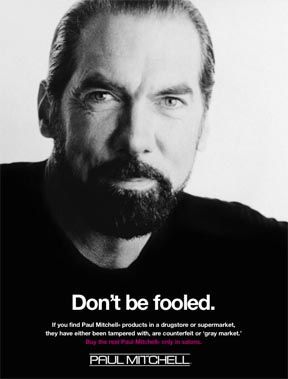 Go to any drugstore or supermarket these days and the aisles are filled with the hottest salon products.
Go to any drugstore or supermarket these days and the aisles are filled with the hottest salon products.
It is estimated that as much as 15 percent of all salon haircare products now are being sold through unapproved retail channels.
But even though technically not illegal for them to be selling these products, haircare companies are fighting what they see as the growing problem of a diversion — a controversial and contetious issue that has gotten worse in recent years.
The implications for consumers include higher prices and poor product quality, not to mention the purchase of products not suited for their hair. It costs manfuacturers and salons millions of dollars per year in lost sales.
 “It’s confusing to the customer,” said Vikki Bresnahan, product security manager for John Paul Mitchell Systems, which has been on the forefront of fighting diversion.
“It’s confusing to the customer,” said Vikki Bresnahan, product security manager for John Paul Mitchell Systems, which has been on the forefront of fighting diversion.
The bottom line, she said, is that “we don’t do business with any drug, grocery or discount stores or any retail Web sites — not EBay, not Amazon.com, not Drugstore.com. All of that product is diverted. We only do business with salons.”
Companies say their reputations are on the line.
Redken believes that only trained and licensed professional stylists can prescribe the best products for their customers.
“If you go to a Target and buy one of our products and it doesn’t work properly, you may never purchase a product from John Paul Mitchell again,” Bresnahan said.
So where did the product come from?
The industry calls it the “gray market.” In some cases, a distributor might order a larger amount than it legitimately is selling to a salon, selling the rest “out the back door” to others. In other cases, wholesale companies employ collectors who approach salons, paying them more than their cost for the product. In some cases, salons start ordering more products to have adequate supply for diverters. There could be several steps between the wholesaler and the consumer, and many retailers may not know where the products come from.
There also are counterfeiters who may knock off salon products, filling the bottles with fake products that might not be clean or safe.
“It’s hugely frustrating,” Bresnahan said. “It causes problems for our salons, which are our No. 1 supporters. Without them, we wouldn’t be where we are today.”
And a lot of salons make most of their money off product sales.
Bresnahan believes it is unfair for drug, grocery and discount retailers to get into the professional haircare business.
“Salons aren’t carrying canned goods or pharmaceutical products,” she said. “Why compete with a salon that’s not competing with them?”
Most companies have statements on their bottles that warn consumers that products can only be guaranteed when sold at professional salons. But companies such as John Paul Mitchell, Graham Webb International and Sebastian International have begun taking more drastic measures to fight diversion, spending millions of dollars.
Since it’s not illegal, it’s up to the manufacturer to catch the wholesalers, distributors and salons that are selling products on the side — a difficult endeavor.
Redken, for example, hired a former FBI agent to develop its strategy and to oversee its anti-diversion program.
Redken codes its products to track their movement, and conducts followup audits of distributorships to find violators. Redken representatives also conduct regular shelf sweeps at unauthorized retail outlets in the United States and some foreign countries. The products are “decoded” in an effort to identify diverters. Redken also offers monetary rewards for supportable information that leads to the identification of diverters of Redken products.
In its newest distributor contracts, L’Oreal Professionel has included a segment specifically addressing diversion and requiring all distributors to put a secondary code on the products to help it track diverted products.
Paul Mitchell even tried to get a law passed that would make diversioin illegal. But the company was unsuccessful in its effort.
Kenra has done a better job than most at fighting diversion. When salon owner Kenneth Anders told Kenra that some of its products were being sold at an Ohio drugstore, Kenra told him to buy out the store’s stock. Seven carfuls and $2,200 later, the problem was fixed.
Ultimately, the consumer is the key to anti-diversion efforts. John Paul Mitchell now runs national television and print ads to get the anti-diversion effort out to consumers. The company is encouraging stylists to talk about the subject with customers while they’re in the chair.
But even when the consumer is fully educated, it’s still a tough battle.
“It’s hard to overcome the convenience,” Bresnahan said.
(NaturallyCurly.com’s CurlMart does not participate in diversion in any way. We wish we could bring you more of the products we know you’d like to buy from us, but to do so would be unethical.”>
